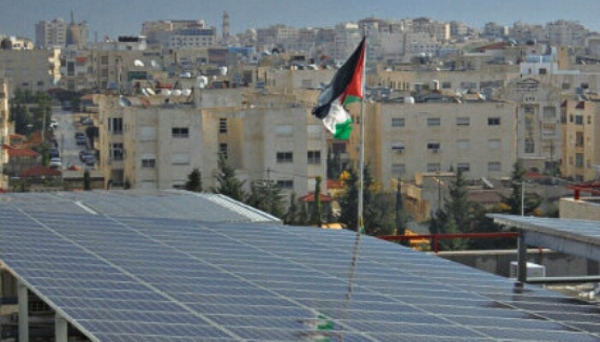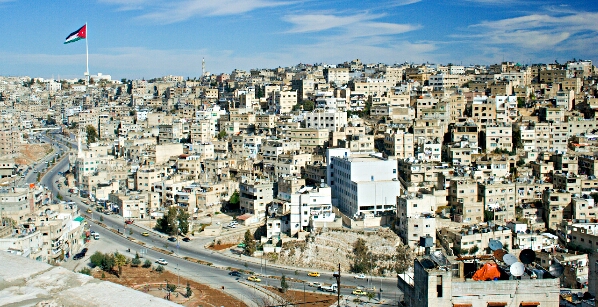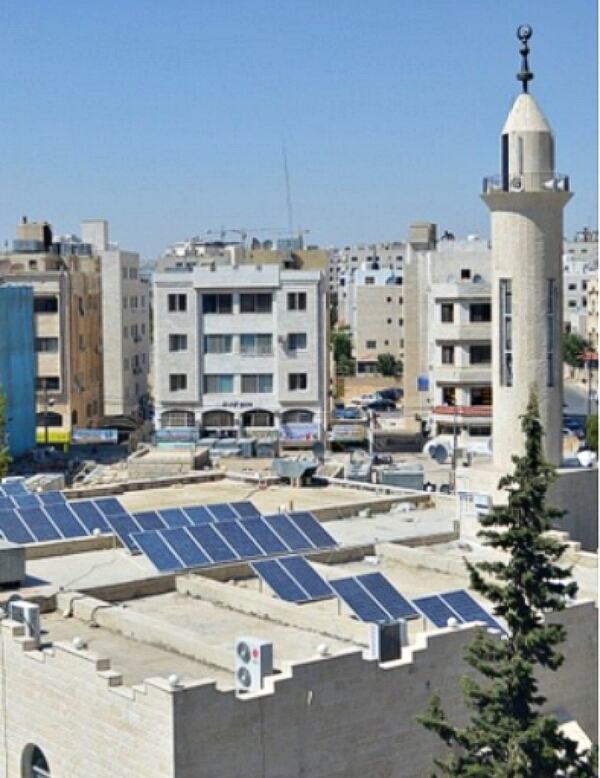PV solar installations are steadily proliferating in Jordan, with the residential and commercial rooftop sectors expecting to see a significant rise in 2015. Already the leader in the Arab world for utility-scale solar PV installations, Jordan also anticipates an additional 200 MW going online in 2015 as many medium- and large-scale solar farms are currently being installed. However, the solar explosion ready to launch in the Hashemite Kingdom of Jordan will best be viewed from the rooftops.

Jordan’s Solar Success is Building on the Roof
2014 saw good progress in Jordan’s rooftop PV installations. In the first quarter of 2014, Trina Solar Limited signed an EPC contract with Fresh Fruits Company, a food storage and logistics company in Amman, Jordan. The 2 MW rooftop solar power plant on the company’s stores and warehouses can produce an estimated 3,200MWh every year while preventing around 38,400 tons of carbon dioxide emissions per year.
Under the contract, Trina Solar was responsible for the engineering, procurement and construction (EPC) of the project, using Trina Solar TSM-PC05A Honey 260 Wp high-efficiency modules. According to a Trina spokesperson, these are especially well adapted to dry and high temperature environments prevalent in Jordan and across the Middle East.
Mr. Omar Hashlmon, General Manager of Fresh Fruits Company said, “Our business of operating cold stores is an energy intensive operation. This project will significantly contribute to a reduction in our annual electricity expenditure. It will also be a sound investment for our company due to the expected quick recovery of the initial investment thanks to favourable renewable energy policies enacted by the local government.”
In September of 2014, Canadian Solar was awarded an agreement to supply modules for a 1.5MW solar rooftop project in Jordan. Canadian Solar provided its 300W 72-cell CS6X300P modules for Kawar Energy, a Middle Eastern engineering, procurement and construction (EPC) company, for their rooftop solar project at a university in Jordan’s capital, Amman.
Rising Energy Prices, Vulnerability, and Consumption
Major oil and gas importing countries such as Jordan are vulnerable to fluctuations in global oil and gas prices. Solar energy is therefore a critical and necessary alternative with huge potential for growth. Domestic energy production costs, and subsequent customer rates, have also been critical factors in solar’s increased popularity in Jordan.
Due to increased consumption, many new electricity power plants are under construction in Jordan, and at least one nuclear power plant is in the works. Since 2008, electricity rates have been continually increasing to keep up with demand, and prices are anticipated to rise even higher in the years to come.

Solar-Friendly Legislation Provides Alternatives
Coupled with rising electricity rates, recent solar-friendly legislation in Jordan is encouraging electric customers to seek alternative renewable energy solutions to meet their needs.
Speaking to pv magazine, Assistant Director Samer Zawaydeh of US-based Association of Energy Engineers said that net-metering installations are facilitating most customer transitions to rooftop solar systems. Zawaydeh, who is based in Jordan and runs an engineering consultancy there, is encouraged about the recent renewable energy legislation.
Zawaydeh explained, “The Renewable Energy and Energy Efficiency Law 13 (REEEL 13), issued 2012, allows any electricity consumer to cover 100% of their electricity needs by installing net-metering solar PV systems.”
REEEL 13 law has had a positive impact on the growing private-sector solar market, allowing net-metering for both residential and commercial business electricity customers. This is coming at the right time because, as Zawaydeh noted, “Jordan’s residential sector has a tariff ranging from $0.05 to $0.37/KWh.” He continued, “Therefore, large consumers paying high electricity tariffs are moving towards installing PV systems. The payback period for them is 30 to 36 months, depending on the details of the components of the installed systems.”
Jordan’s Citizens Have Embraced Solar Technology
Unlike Egypt, which is struggling to embrace rooftop solar at the residential level, Zawaydeh stated that Jordan’s citizens have embraced solar technology all the way down to the private homes. “The decentralized residential and commercial solar PV market started with around 40 companies in December 2012,” he said, “and now has hundreds of companies working in the field.”
Continuing, Zawaydeh added, “A simple search for companies with ‘renewable energy’ as one of their business activities will yield in excess of 500 hits. More than five thousand people are working in the supply chain from design, procurement, electrical, mechanical and civil Installation, quality control, safety, commissioning and operation and maintenance,”
The Ministry of Energy and Mineral Resources of Jordan confirms these statements. According to its recent statistics, 23.4 MW of capacity is installed, spread between 747 PV systems. Records indicate that these systems are installed at 515 private homes, 80 Islamic mosques, 65 private businesses, 30 educational facilities, 20 public sector buildings, nine financial institutions, nine hospitals, eight telecommunication stations, four churches, four private universities, and two farms.
Zawaydeh noted one more positive point in Jordan’s renewable energy legislation, saying, “bylaw No. 10 under the REEEL 13 provides custom duty exemption and sales tax exemption for renewable energy systems as incentive to investors in these fields.” Applicable to all renewable energy systems imported to Jordan, Bylaw No. 10 is facilitating a rise in renewable energy investments at all levels, encouraging a great spirit of optimism.
Huge Rooftop Solar News Flash From Jordan
A new announcement this week is carrying Jordan’s spirit of optimism into the realm of spirituality. In a huge new development for 2015, all of the country’s 6,000 mosques will receive rooftop PV solar systems. The Ministry of Energy and Mineral Resources is collaborating with the Ministry of Awqaf and Islamic Affairs to implement a new project of installing the PV systems at all mosques in Jordan.
Representative Ahmad Abu Saa, of Jordan’s Ministry of Energy and Mineral Resources, Renewable Energy Department, related the announcement of this significant new project in an interview with The Jordan Times this week.
Abu Saa noted, “Mosques use large amounts of electricity and the project will help to significantly reduce their electricity bills as around 300 days in the year are sunny.” Jordan’s new solar mosque project will start by covering 120 mosques, and Abu Saa added that tenders will soon be floated for additional solar installations at other mosques across the kingdom.
(For a full report, read my article on EdenKeeper.org: Jordan Transitioning 6,000 Mosques to Solar Energy)

sounds great. 🙂 keep tracking http://www.keralahseresults2015.com